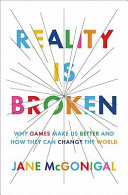There is a mass exodus into the virtual world
The real world just doesn’t offer up as easily the carefully designed pleasures, the thrilling challenges, and the powerful social bonding afforded by virtual environments. Reality doesn’t motivate us as effectively. Reality isn’t engineered to maximize our potential. Reality wasn’t designed from the bottom up to make us happy.
And so, there is a growing perception in the gaming community:
Reality, compared to games, is broken.
In fact, it is more than a perception. It’s a phenomenon. Economist Edward Castronova calls it a “mass exodus” to game spaces, and you can see it already happening in the numbers. Hundreds of millions of people worldwide are opting out of reality for larger and larger chunks of time. In the United States alone, there are 183 million active gamers (individuals who, in surveys, report that they play computer or video games “regularly”—on average, thirteen hours a week).3 Globally, the online gamer community—including console, PC, and mobile phone gaming—counts more than 4 million gamers in the Middle East, 10 million in Russia, 105 million in India, 10 million in Vietnam, 10 million in Mexico, 13 million in Central and South America, 15 million in Australia, 17 million in South Korea, 100 million in Europe, and 200 million in China.
Although a typical gamer plays for just an hour or two a day, there are now more than 6 million people in China who spend at least twenty-two hours a week gaming, the equivalent of a part-time job.5 More than 10 million “hardcore” gamers in the United Kingdom, France, and Germany spend at least twenty hours a week playing.6 And at the leading edge of this growth curve, more than 5 million “extreme” gamers in the United States play on average forty-five hours a week.7
With all of this play, we have turned digital games—for our computers, for our mobile phones, and for our home entertainment systems—into what is expected to be a $68 billion industry annually by the year 2012.8 And we are creating a massive virtual silo of cognitive effort, emotional energy, and collective attention lavished on game worlds instead of on the real world.
[...]
As we make these value judgments, hold moral debates over the addictive quality of games, and simultaneously rush to achieve massive industry expansion, a vital point is being missed. The fact that so many people of all ages, all over the world, are choosing to spend so much time in game worlds is a sign of something important, a truth that we urgently need to recognize.
The truth is this: in today’s society, computer and video games are fulfilling genuine human needs that the real world is currently unable to satisfy. Games are providing rewards that reality is not. They are teaching and inspiring and engaging us in ways that reality is not. They are bringing us together in ways that reality is not.
And unless something dramatic happens to reverse the resulting exodus, we’re fast on our way to becoming a society in which a substantial portion of our population devotes its greatest efforts to playing games, creates its best memories in game environments, and experiences its biggest successes in game worlds.
Notes:
Folksonomies: education gamification
Taxonomies:
/art and entertainment/movies and tv/reality (0.603360)
/society (0.398612)
/hobbies and interests/games/video and computer games (0.333125)
Keywords:
real world (0.951552 (positive:0.425115)), game worlds (0.923617 (negative:-0.034343)), mass exodus (0.831365 (positive:0.925366)), carefully designed pleasures (0.798644 (positive:0.925366)), powerful social bonding (0.789626 (positive:0.754503)), reality (0.781492 (negative:-0.064692)), United States (0.774732 (negative:-0.293848)), mobile phone gaming—counts (0.750239 (negative:-0.245702)), video games (0.746156 (positive:0.338364)), typical gamer plays (0.741759 (negative:-0.319817)), massive virtual silo (0.734065 (negative:-0.498961)), massive industry expansion (0.718785 (positive:0.341687)), genuine human needs (0.717263 (negative:-0.610877)), virtual environments (0.618429 (neutral:0.000000)), thrilling challenges (0.618038 (positive:0.588084)), virtual world (0.615894 (positive:0.925366)), active gamers (0.615759 (neutral:0.000000)), Economist Edward (0.607853 (positive:0.311715)), larger chunks (0.605034 (negative:-0.501325)), gaming community (0.600329 (positive:0.560443)), Middle East (0.593892 (neutral:0.000000)), —on average (0.592797 (negative:-0.322842)), online gamer (0.592686 (negative:-0.206597)), South America (0.587503 (neutral:0.000000)), growth curve (0.585566 (positive:0.459663)), digital games—for (0.584561 (neutral:0.000000)), home entertainment (0.583771 (positive:0.488185)), United Kingdom (0.583401 (neutral:0.000000)), vital point (0.582824 (negative:-0.604906)), value judgments (0.582434 (positive:0.342963))
Entities:
United States:Country (0.786806 (negative:-0.293848)), China:Country (0.681895 (negative:-0.221473)), virtual world:FieldTerminology (0.678785 (positive:0.925366)), Castronova:Person (0.652016 (negative:-0.240592)), Middle East:Region (0.546582 (neutral:0.000000)), mobile phone:FieldTerminology (0.542250 (negative:-0.245702)), South Korea:Country (0.529538 (neutral:0.000000)), Mexico:Country (0.525870 (negative:-0.208556)), South America:Continent (0.525870 (neutral:0.000000)), United Kingdom:Country (0.522918 (neutral:0.000000)), mobile phones:FieldTerminology (0.522808 (positive:0.358656)), Edward:Person (0.516905 (positive:0.311715)), Vietnam:Country (0.502621 (neutral:0.000000)), Europe:Continent (0.497789 (neutral:0.000000)), India:Country (0.492053 (neutral:0.000000)), Australia:Country (0.476429 (neutral:0.000000)), Russia:Country (0.466989 (neutral:0.000000)), home entertainment:FieldTerminology (0.464184 (positive:0.488185)), Germany:Country (0.457066 (negative:-0.209561)), France:Country (0.441520 (neutral:0.000000)), forty-five hours:Quantity (0.441520 (neutral:0.000000)), twenty-two hours:Quantity (0.441520 (neutral:0.000000)), thirteen
hours:Quantity (0.441520 (neutral:0.000000)), twenty hours:Quantity (0.441520 (neutral:0.000000)), $68 billion:Quantity (0.441520 (neutral:0.000000))
Concepts:
Gamer (0.965890): dbpedia | freebase
Truth (0.842806): dbpedia | freebase
Mobile phone (0.813786): dbpedia | freebase | opencyc
United States (0.806345): website | dbpedia | ciaFactbook | freebase | opencyc | yago
United Kingdom (0.790738): geo | website | dbpedia | ciaFactbook | freebase | opencyc | yago
World (0.741086): dbpedia | ciaFactbook | freebase
Gaming (0.714216): dbpedia
Virtual reality (0.666286): dbpedia | freebase | opencyc





